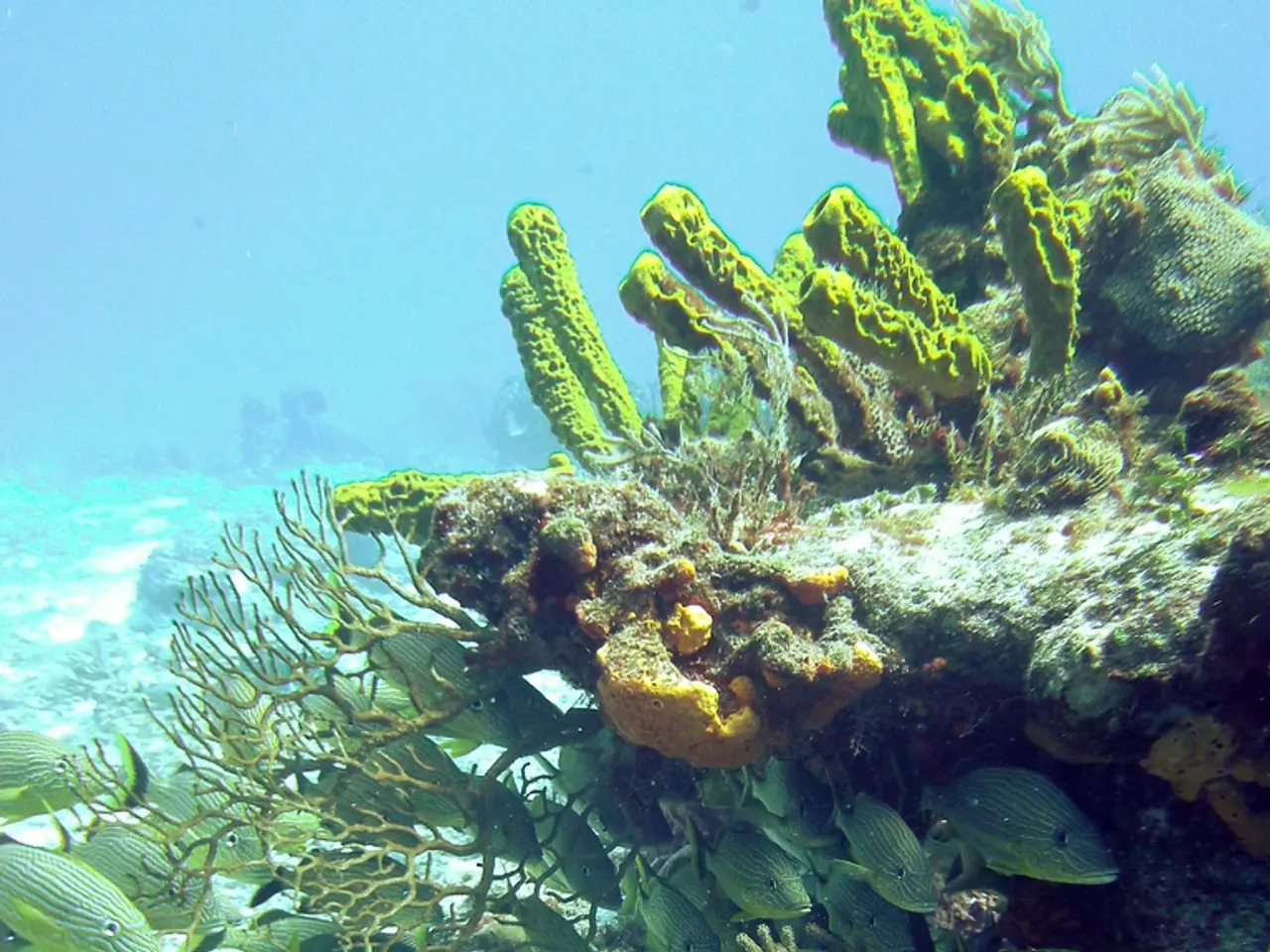Struggle Over the Ocean Depths
The deep sea, a little-explored and mysterious realm, is emerging as a potential treasure trove of critical metals essential for modern technology. These metals, including manganese, nickel, cobalt, copper, iron, zinc, titanium, platinum, and rare earth elements, are crucial components in electric vehicle batteries, renewable energy, and defense systems[1][2][3].
Three primary types of deep-sea deposits are being targeted: polymetallic nodules, cobalt-rich crusts, and marine sulfide ores. Polymetallic nodules, resembling potato-sized rocks, are rich in manganese, nickel, copper, and cobalt and extend across large oceanic areas[2][4]. Cobalt-rich crusts, hard mineral layers found on slopes or peaks of submarine volcanoes, contain cobalt, nickel, manganese, and strategic minerals[3]. Lastly, marine sulfide ores are deposited near hydrothermal vents and contain iron, copper, cobalt, zinc, and other metals[1][3].
The race to exploit these deep-sea resources is a global issue involving multiple states, driven by the potential to meet the increased demand for metals in electromobility and alternative energy sources. Countries with seabed territories rich in these deposits, such as Japan, the U.S., and Pacific island nations, see deep-sea mining as a way to secure critical minerals vital for economic growth, energy security, and national defense[2][3].
However, this pursuit is not without controversy. Deep-sea mining could cause irreversible harm to marine ecosystems, which are already stressed by climate change. There is ongoing debate between industry proponents arguing for the necessity of these minerals for the green transition and environmentalists warning about ecological consequences[2]. A recent scientific discovery noted that polymetallic nodules may contribute to a process called "dark oxygen" production, where oxygen is generated without sunlight through seawater electrolysis as metals accumulate, adding a new dimension to the ecological importance of these deposits[4].
U.S. federal agencies have recently taken steps to streamline regulations for deep-sea mineral exploration to accelerate industry development while aiming to preserve environmental safeguards. This indicates a governmental push to lead in responsible offshore critical mineral development amid increasing global competition[2][4]. However, much of the deep-sea lies beyond national jurisdictions, invoking international law under the United Nations Convention on the Law of the Sea (UNCLOS). The potential for overlapping claims and environmental concerns makes international cooperation and regulation critical to prevent conflicts and ecological damage.
In summary, deep-sea resource exploration opens vast opportunities for accessing critical metals required for emerging technologies and energy transitions. However, this potential comes with complex geopolitical dynamics and significant environmental concerns that necessitate balanced regulatory frameworks and international cooperation[1][2][3][4][5].
[1] Deep-Sea Mining: A New Frontier for Critical Metals. (2022). Retrieved from https://www.sciencedirect.com/science/article/pii/S2468063X21000491 [2] The Race for Deep-Sea Resources. (2021). Retrieved from https://www.scientificamerican.com/article/the-race-for-deep-sea-resources/ [3] The Deep-Sea Mining Debate. (2021). Retrieved from https://www.nature.com/articles/d41586-021-01526-z [4] Deep-Sea Mining and the Ocean's Dark Oxygen. (2021). Retrieved from https://www.nature.com/articles/d41586-021-01776-4 [5] Deep-Sea Mining: A Global Race for Resources. (2020). Retrieved from https://www.theguardian.com/environment/2020/dec/02/deep-sea-mining-a-global-race-for-resources-as-companies-rush-to-exploit-oceans-rich-in-rare-earth-metals
- The potential treasure trove of critical metals in the deep sea, including those found in Asia, Africa, and America, has sparked interest in environmental-science, industry, finance, and energy sectors, as these metals are essential for emerging technologies, electromobility, alternative energy sources, and defense systems.
- Africa, with its under-explored deep-sea territories, could potentially hold valuable deposits of polymetallic nodules, which contain manganese, nickel, copper, and cobalt, and extend across large oceanic areas.
- In Asia, nations with seabed territories rich in these deep-sea deposits, such as Japan and Pacific island nations, are keen on deep-sea mining as a means to secure critical minerals for economic growth, energy security, and national defense.
- The debate over deep-sea mining's impact on the environment, particularly in sensitive ecosystems like those in Africa and the impact on the environment-science, is a significant concern for environmentalists, as the process could cause irreversible harm, exacerbating issues already stemming from climate change.




